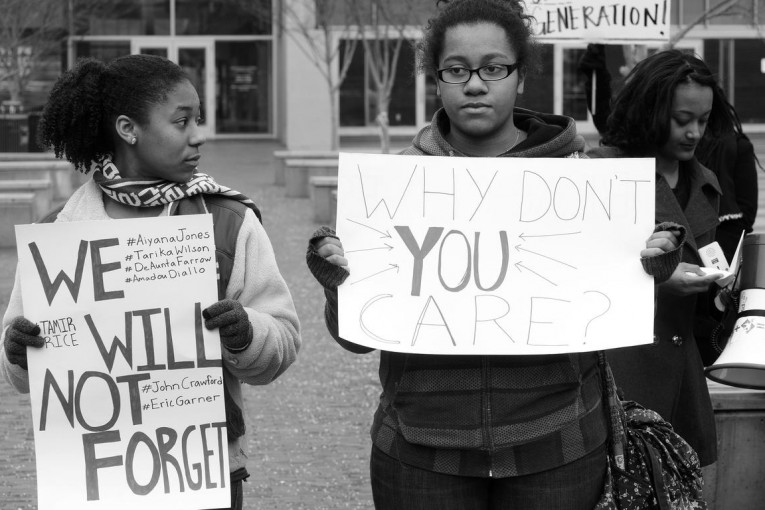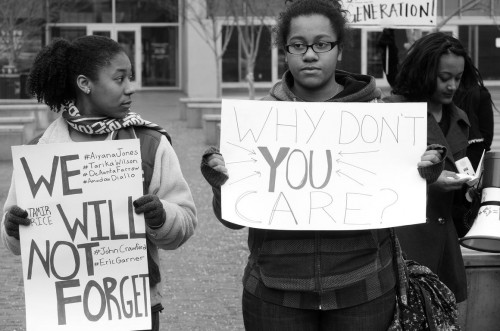

By Sandra Park
Black Women and Black Lives Matter: In the year since Ferguson, we have been reminded that police misconduct and brutality doesn’t discriminate, at least not based on gender. We know that Black women, like Sandra Bland and others before her, aren’t spared from police violence. Several commentators, including Charles Blow, Lisalyn Jacobs, and Roxane Gay, have authored profound pieces about Black women’s experiences and the cloak of invisibility that too often surrounds them, particularly when the discussion turns to violence, police misconduct, and holding law enforcement accountable.
Fortunately, that is changing. #SayHerName has elevated and honored Black women’s experiences and the dynamic #BlackLivesMatter social justice movement has broadened the conversation to highlight the many ways in which all Black people are affected by violence, police misconduct, and injustice.
But the lens must expand even further. When we speak of the reality of Black women’s lives and efforts to reform the criminal justice system, we must continue to also speak about gender bias in policing and how it results in improper, and often illegal, police responses to domestic violence and sexual assault cases.
The reality is domestic violence-related calls constitute the single largest category of calls received by the police. Over one million women are sexually assaulted each year, and more than a third of women are subjected to rape, physical violence and/or stalking by an intimate partner in their lifetime. And have no doubt: Black women and other women of color are disproportionately impacted.
Here are just a handful of stories about police misconduct in domestic violence and sexual assault cases that acknowledge the experiences of women at the intersection of racial and gender biased policing:
- In Detroit, researchers documented how stereotyping of sexual assault victims – a significant percentage of whom were African-American – led to poor criminal investigations and failure by police to submit thousands of sexual assault kits for testing.
- In Oklahoma, 13 women reported that a police officer sexually molested them while he was on duty; that officer now faces 36 charges including felony rape, forcible oral sodomy and sexual battery.
- In Puerto Rico, the police department systematically underreported rape crimes and rarely took action when their own officers committed domestic violence, allowing 84 officers who had been arrested two or more times for domestic violence to remain active.
- In Norristown, PA, Lakisha Briggs, an African-American woman, faced eviction because police concluded that acts of domestic violence perpetrated against her – including a stabbing that required her to be taken by helicopter to a trauma center – should be considered nuisances under a local ordinance.
There are countless stories just like these and even more that are untold or forgotten. These types of discriminatory police practices – abuses committed by officers, refusal to enforce established laws, misclassification or dismissal of domestic violence or sexual assault complaints – are deeply harmful and violate victims’ civil rights. They jeopardize women’s lives and safety, undermine efforts to end domestic violence and sexual assault, reduce confidence in the criminal justice system, and further the perpetuation of violence by discouraging victims from coming forward and allowing abusers to continue to commit crimes with impunity.
In spite of these troubling patterns, systemic discrimination by law enforcement is receiving attention due to the critical dialogue sparked by the Black Lives Matter movement. Indeed, The U.S. Department of Justice has highlighted and investigated gender-biased policing. And just last month the ACLU took lead in drafting a letter signed by 88 national organizations and 98 state and local groups asking DOJ to issue guidance to law enforcement agencies about how to ensure that their policies and practices are free of gender bias. These harmful and violative practices will not disappear on their own. We hope DOJ will act soon.
Until then, we will keep fighting.
Sandra Park is the Senior Staff Attorney with the ACLU Women’s Rights Project
Perhaps all heterosexual rapes and domestic violence should be considered hate crimes against women.
Sandra Park seems to be working hard to inflate her purpose. This article reads like the sky is falling, yet there is really not much here in the way of evidence that the sky is falling. We can go around the country (and world apparently) to cherry-pick events; but that does not mean we have a national crisis that demands we rob our limited resources to do battle.
This is really just another attack piece against law enforcement and the criminal justice system. But instead of the typical racism claim, this one moves into gender bias too.
It is the political season and the crusaders of leftism rely on the narrative of racism and the “war against women” (a foolish claim, IMO) to gain and maintain their hold on political power. Victims unite!
We can all agree that people behave badly and their confirmation biases cause them to miss opportunities to do and say the right things. There are constant learning opportunities for individuals to grow better at doing and saying the right things… to become a better person. And ACLU attorneys seem to have a very long list of opportunities.
#All lives matter
http://fusion.net/story/170591/the-next-time-someone-says-all-lives-matter-show-them-these-5-paragraphs/
I read it twice and it is just a bunch of blabber and twadle. How can anyone defend those upset with “all lives matter”? Especially since more whites are killed by cops.
Frankly
“it is just a bunch of blabber and twaddle”
“That’s the situation of the “black lives matter” movement. Culture, laws, the arts, religion, and everyone else repeatedly suggest that all lives should matter. Clearly, that message already abounds in our society.”
The “message abounds” but the reality does not.
It is only “blabber and twaddle” if you are willing to accept platitudes and “hurrah for our side” and “we have the greatest system of …..” as more meaningful than the daily reality of life for some groups in our society, such as blacks, for whom these shining phrases do not match the reality of their daily lives.
It does not matter to me at whom a finger of blame is pointed for the current social disparities. The fact is that these social disparities exist, and we ( as a society) prefer arguing over ideologic extremes to actually doing what is needed to address the problems which affect real people every day. The solutions that we have chosen to date with ongoing implementation of our ” a rising tide lifts all boats” has not worked. Doling out pittances at a time to maintain families and children at a or near the poverty line has not worked.
Yep
Frankly
“We can go around the country (and world apparently) to cherry-pick events; but that does not mean we have a national crisis that demands we rob our limited resources to do battle.”
I see the “cherry picking” being used widely to portray some events as more indicative of the existence of a “national crisis” than others. For a look at the flip side of the coin, take the example of the murder of Kathryn Steinle by Francisco Sanchez. This murder was clearly a preventable tragedy. And yet we know that most murders do not occur across social groups. This was an isolated incident, and yet it has been used as a national “the sky is falling” event prompting a bandwagon of “we have to do something now”.
And yet domestic violence is a daily event in our country. It cuts across all groups, racial , ethnic, religious, class, profession….
It is hidden at all levels of our society. The perpetrators hide it, the victims hide it, families hide it, our social institutions including our police and courts hide it. Despite its daily occurrence, and the fact that it takes the lives of those in our own communities ( including a Family Practitioner known to me) we do not perceive this as a crisis. I would call out the existence of domestic violence as the root of our very, very violent society. And yet we do not perceive this as a crisis. I see this as very curious.